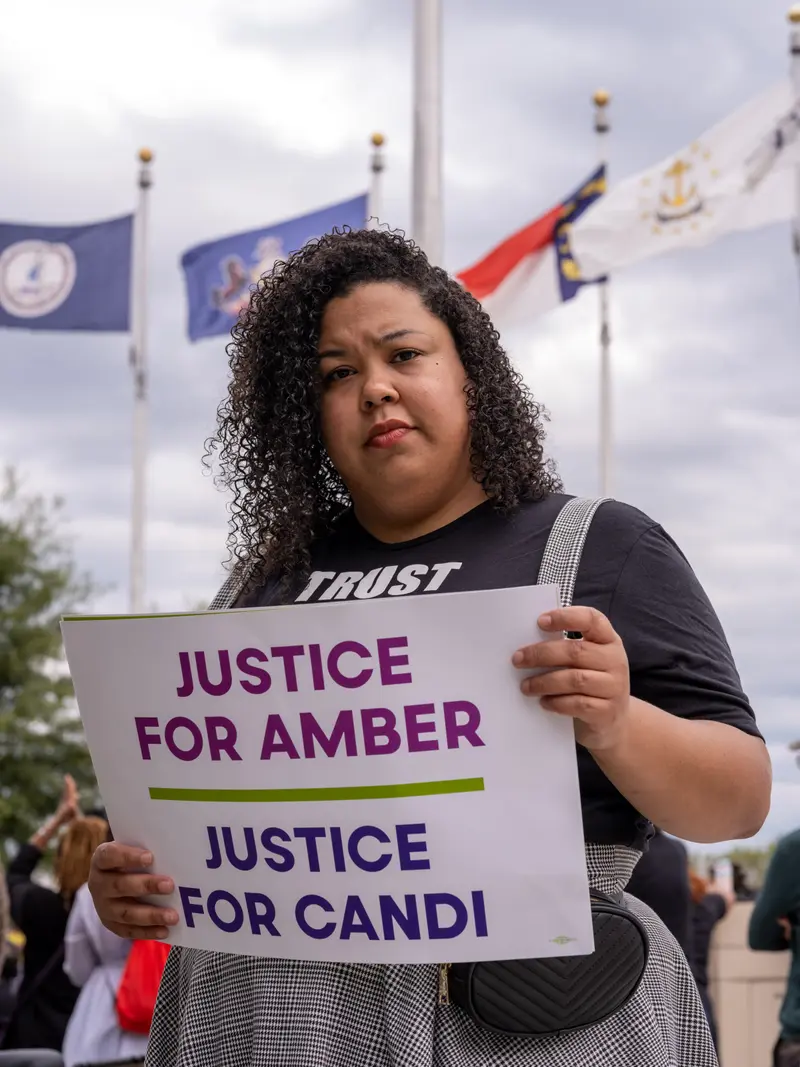Women in Georgia can once again legally obtain abortions after six weeks of pregnancy, following a judge’s strongly worded order this week tossing the state’s ban. While Gov. Brian Kemp spoke out against the decision and Georgia’s attorney general quickly appealed it, providers told ProPublica they have immediately resumed offering such care.
Planned Parenthood’s four clinics in Georgia are fielding an influx of calls from within the state and those around it where most abortions remain banned, said Jaylen Black, vice president of marketing and communications for the organization’s Southeast region. Workers are also calling patients they have previously had to turn away. “We’ve been able to get them rescheduled,” Black said.
The new, if temporary, access is the latest in a wave of developments in the two weeks since ProPublica told the stories of Amber Nicole Thurman and Candi Miller, Georgia women who died after they couldn’t access legal abortions and timely medical care in their state. A committee of maternal health experts, including 10 doctors, deemed their deaths “preventable,” shifting the discussion about such outcomes from hypothetical to a new American reality.
“This isn’t something that the state will easily be able to sweep under the rug,” said Monica Simpson, executive director of SisterSong, one of the plaintiffs in the lawsuit challenging the ban. “It is now a national issue.”
The women’s stories reverberated through the U.S. Senate, the vice presidential debate and a demonstration outside the Georgia Capitol. Vice President Kamala Harris spoke to one of their families alongside Oprah Winfrey, then traveled to Atlanta to give a speech about them. “Now we know that at least two women — and those are only the stories we know — here in the state of Georgia died — died because of a Trump abortion ban,” she told the crowd. Before launching into the details of the first, she led the crowd in a chant to “speak her name: Amber Nicole Thurman, Amber Nicole Thurman, Amber Nicole Thurman.”
Thurman died on Aug. 19, 2022, one month after Georgia’s law went into effect banning abortion before many women know they’re even pregnant. Thurman had traveled to North Carolina, where she obtained abortion medication, and had not fully expelled the fetal tissue.
She sought care for the rare complication at a suburban Atlanta hospital, where she was diagnosed with sepsis, a life-threatening infection. As her condition deteriorated, doctors discussed a procedure to empty the uterus called a dilation and curettage, or D&C; the state had recently attached criminal penalties to performing it, with few exceptions. It took 20 hours after Thurman’s arrival for doctors to do so, according to records reviewed by ProPublica. It came too late.
Miller, who died Nov. 12, 2022, had lupus, diabetes and hypertension, and doctors warned another pregnancy could kill her. She ordered abortion pills online, but she also did not expel all the fetal tissue and needed a D&C. Her family later told a coroner she hadn’t visited a doctor “due to the current legislation on pregnancies and abortions.” Her children watched her suffer in bed for days, moaning in pain. She ultimately took a lethal combination of painkillers.
Georgia’s maternal mortality review committee, tasked with studying deaths of pregnant women and new mothers to recommend improvements in care, directly blamed the state’s abortion ban for Miller’s death, according to members who spoke to ProPublica on the condition of anonymity. The committee found that the hospital’s delay in performing the critical procedure on Thurman had a “large” impact on her “preventable” outcome. The hospital and doctors involved in her care have not explained the delay or commented on her case; an attorney hired by Thurman’s family said the hospital was within its legal rights to perform the procedure.


Credit:
Courtesy of Turiya Tomlin-Randall
While defenders of the ban have said it includes an exception to save the life of the mother, doctors have told ProPublica that the language doesn’t account for the fast-moving realities of emergency medicine or the complexities of maternal health.
Though Miller’s underlying conditions would have made her pregnancy riskier as it progressed, that alone did not qualify her for an abortion. And once she and Thurman needed a D&C to clear the fetal tissue, neither of their cases appeared to clearly fit the language of the ban’s exception allowing doctors to perform it.
It allows doctors to remove “a dead unborn child” that resulted from a “spontaneous abortion” defined as “naturally occurring” from a miscarriage or a stillbirth. Thurman had told doctors her miscarriage was not spontaneous but the result of abortion pills. Most bans including Georgia’s also allow abortions “necessary in order to prevent the death of the pregnant woman or the substantial and irreversible physical impairment of a major bodily function.” There is no standard protocol for how providers should interpret such language, doctors have told ProPublica — or how far gone a patient needs to be to qualify.
Forty-one senators introduced a resolution inspired by ProPublica’s reporting that calls on hospitals in all states to provide emergency abortion care when their patients need it. Sen. Ron Wyden, an Oregan Democrat who chairs the powerful Senate Finance Committee, has a pending request for information from the hospital that treated Thurman to determine whether doctors violated a federal law that requires them to provide emergency care. (The hospital has not responded to ProPublica’s requests seeking comment on those questions about its adherence to the law.)
And in Georgia on Monday, Fulton County Superior Judge Robert C. I. McBurney struck down key parts of the state’s ban criminalizing nearly all abortions after about six weeks.
“It is not for a legislator, a judge, or a Commander from ‘The Handmaid’s Tale’ to tell these women what to do with their bodies during this period when the fetus cannot survive outside the womb,” McBurney’s ruling states.
“The Court finds that, until the pregnancy is viable, a woman’s right to make decisions about her body and her health remains private and protected, i.e., remains her business and her business alone. When someone other than the pregnant woman is able to sustain the fetus, then — and only then — should those other voices have a say in the discussion about the decisions the pregnant woman makes concerning her body and what is growing within it.”
In reversing the six-week ban, McBurney reverted to the state’s previous standard, which allowed abortion up until a fetus was deemed viable, at about the 22nd week of pregnancy.
Kemp, a Republican who said he was “overjoyed” when the ban first went into effect, said this week through a spokesperson: “Once again, the will of Georgians and their representatives has been overruled by the personal beliefs of one judge.”

Credit:
Nydia Blas for ProPublica
The ruling marks the second time McBurney has blocked the state abortion ban.
In 2022, he issued a ruling that the law was unconstitutional when the state legislature passed it in 2019, frozen in the books until after the U.S. Supreme Court struck down the federal constitutional right to abortion three years later. The state appealed, and its Supreme Court reinstated the ban until it could review McBurney’s ruling.
About a year later, with the ban still in place, the state Supreme Court rejected the argument, sending the case back to McBurney to consider the lawsuit’s underlying question: Whether the Georgia Constitution protects the right to privacy and, if so, if that right includes abortion. McBurney’s ruling Monday emphatically says it does.
While McBurney allowed abortions to resume in Georgia, the Supreme Court could, once again, stay the judge’s ruling until it takes up the case.
The last time it did so, the window of abortion access in Georgia lasted eight days.
The urgency and impermanence of this moment in Georgia was palpable in conversations with providers. “I think this type of moment definitely feels like a demand to provide a lot of care to as many people as possible,” said Kristen Baker, public affairs manager and lobbyist for the Feminist Women’s Health Center, which operates a clinic in Georgia.
Black said that Planned Parenthood staff is doing all it can — “for the time being” — to meet the demand and “getting people in our doors as soon as possible.”
Kavitha Surana contributed reporting. Mariam Elba and Cassandra Jaramillo contributed research.

